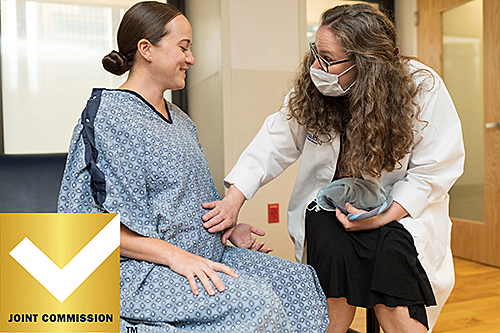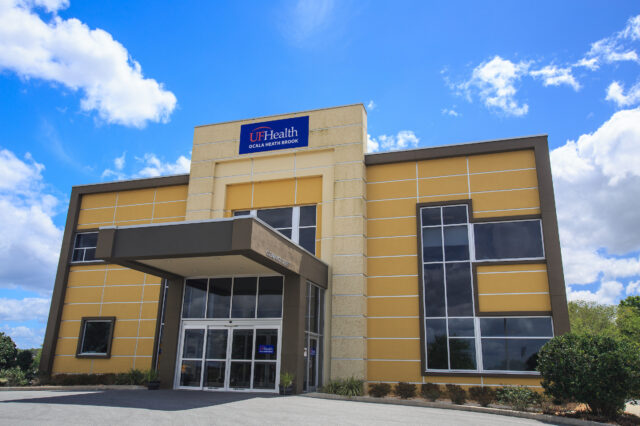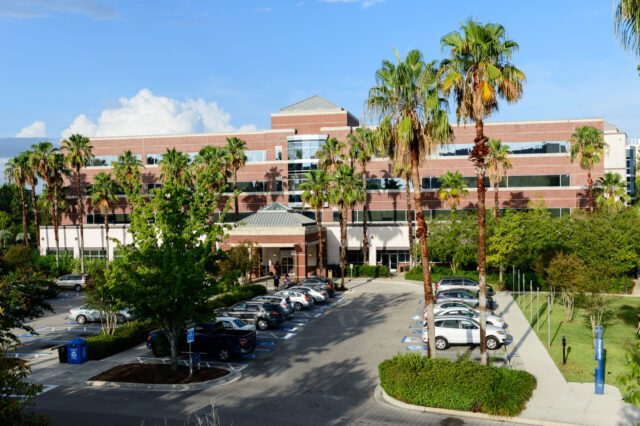At UF Health, we understand that pregnancy is a special time in a woman's life, and we are committed to providing exceptional, multidisciplinary care to ensure the health and well-being of both mothers and babies. Our Maternal and Fetal Medicine Program combines advanced medical expertise, state-of-the-art technology and compassionate care to support you every step of the way.
What is Maternal and Fetal Medicine?
Maternal and Fetal Medicine is a specialized branch of obstetrics that focuses on managing high-risk pregnancies and providing comprehensive care for both the mother and the developing baby. Our team of experienced maternal and fetal medicine specialists work collaboratively to address the unique needs and challenges that arise during pregnancy, ensuring the best possible outcomes for both mother and baby.
Our approach to care
When it comes to your health and the health of your baby, we leave no stone unturned. UF Health offers a comprehensive range of services designed to meet the specific needs of each individual. Here's what sets us apart:
- Highly Skilled Team: Our program is led by a team of board-certified physicians who are experts in managing high-risk pregnancies. They are supported by a dedicated team of nurses, genetic counselors and other specialists — all working together to provide the highest level of care.
- Advanced Diagnostic Services: We utilize cutting-edge technology and advanced imaging techniques to accurately diagnose and monitor various conditions and abnormalities throughout pregnancy. Our state-of-the-art ultrasound equipment allows us to assess fetal development, identify potential complications and guide interventions when necessary.
- Personalized Treatment Plans: We believe in tailoring our care to the unique needs of each patient. Our team takes the time to thoroughly evaluate your medical history, perform comprehensive screenings, and develop personalized treatment plans that prioritize your health and the health of your baby.
- Collaboration and Coordination: Our multidisciplinary approach means that you benefit from the collective expertise of various specialists, all working together to provide seamless care. We collaborate closely with other healthcare professionals, including obstetricians, neonatologists, geneticists and pediatric subspecialists, to ensure a holistic approach to your care.
- Family-Centered Care: We understand the importance of emotional support during pregnancy. Our team is committed to providing compassionate care and clear communication, addressing your concerns and involving you in the decision-making process. We believe that an informed and empowered patient leads to better outcomes for both mother and baby.
Frequently asked questions
What is a Maternal and Fetal Medicine specialist?
Maternal and Fetal Medicine (MFM) specialists work closely with other healthcare providers, including obstetricians, neonatologists and genetic counselors, to provide comprehensive care for high-risk pregnancies. They use advanced diagnostic tools and techniques to monitor the health and development of both the mother and the fetus throughout the pregnancy, and they develop personalized management plans to optimize the outcome for both.
Once a high-risk pregnancy has been identified, the MFM specialist will work closely with the patient to develop a personalized management plan. This plan may include a combination of medication, lifestyle modifications and specialized monitoring throughout the pregnancy. MFM specialists may also coordinate care with other specialists, such as neonatologists, to ensure a smooth transition to the neonatal intensive care unit (NICU) in the event that the baby requires specialized care after delivery.
What is high-risk pregnancy?
High-risk pregnancy, also known as a complicated pregnancy, refers to a pregnancy that poses a higher risk of complications for the mother and/or the fetus. These pregnancies require careful monitoring and management to ensure the best possible outcome for both the mother and the baby.
What makes a pregnancy high risk?
There are many factors that can contribute to a pregnancy being considered high-risk, including maternal age (being younger than 17 or older than 35), pre-existing medical conditions (such as diabetes, hypertension or heart disease), a history of previous pregnancy complications, multiple pregnancies (such as twins or triplets) and certain lifestyle factors (such as smoking, alcohol use or drug use).
How often do you go to the doctor in high risk pregnancy?
High-risk pregnancies require close monitoring and management by a team of healthcare providers, which may include obstetricians, maternal-fetal medicine specialists and neonatologists. These providers collaborate to identify potential complications early and develop a plan of care to address them. It is important for women with high-risk pregnancies to work closely with their healthcare providers to ensure the best possible outcome for themselves and their babies. With proper management and care, many high-risk pregnancies result in the delivery of healthy babies.
What are some common medical conditions that arise in high-risk pregnancy?
Common complications associated with high-risk pregnancies include preeclampsia, gestational diabetes, preterm labor, placenta previa, placental abruption and fetal growth restriction. Women with high-risk pregnancies may require more frequent prenatal visits, specialized testing (such as ultrasounds, fetal monitoring or amniocentesis) and closer observation during labor and delivery.
Do you get put on bed rest during high-risk pregnancy?
Depending on the specific circumstances of the high-risk pregnancy, healthcare providers may recommend interventions such as bed rest, medication or early delivery via induction or cesarean section. In some cases, high-risk pregnancies may require delivery at a hospital with specialized facilities to manage potential complications.












